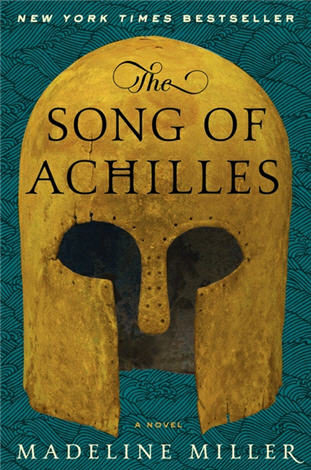Fantasy novel, The Song of Achilles, is a tune you don’t want to miss

Song of Achilles US book cover, August 2012
September 16, 2014
Finding good books to read nowadays is a task for the brave. I find that, depending on a reader’s luck, taking a dip into the pool of literary choices can have either rewarding or horrific results. Take a chance on the novel The Song of Achilles. While there have been mixed views for Madeline Miller’s first novel, it has been fairly successful since it was published in August of 2012.
The story is a retelling of the epic The Iliad by Homer. Miller artfully tells the story from the perspective of Achilles’ companion, Patroclus, whose own doom eventually leads to the invincible demigod’s death. The twist that Miller makes, to the dismay of some critical readers, is portraying the relationship between Patroclus and Achilles as one of lovers instead of close friends or, as the film Troy (2004) depicted, cousins.
In an interview with Gregory Maguire (the author of Wicked), Miller said, “I had been intensely frustrated by a number of articles I had read that kept sidestepping the love between him and Achilles, which to me felt so obviously at the story’s heart.”
The book begins with Patroclus being presented as a suitor to Helen of Troy, famous for her unspeakable beauty. Miller then takes the reader through the tale of how Patroclus is thrown out of his home kingdom by his cruel father – all because he accidentally causes the death of the son of an important noble.
All of the facts surrounding the life and story of Patroclus are purely Miller’s own as very little is ever revealed about his character in The Iliad. Because of this, the novel may, in fact, be a retelling of Homer’s work but in the end also a strong piece of Miller’s own. The characters and story are retold in such a modern, creative way that they have the feeling of being hers and nobody else’s.
Patroclus tells his story as he is whisked away to be under guidance of the ruler of Aegina: King Peleus. Peleus is the father of Achilles (a demigod due to his mother being a sea nymph named Thetis). Patroclus immediately becomes an interest to Prince Achilles who is curious about the newcomer’s past and pessimistic outlook on life.
I admit I felt that the beginning of the novel was a bit rough to start off with because it was somewhat dull and cliched. Once Patroclus went with Achilles to train with the legendary mentor for Hercules and other Greek heroes, Chiron the centaur, my interest had been caught. Instead of a cheesy romance, Miller quickly develops the friendship between Achilles and Patroclus expertly.
Their relationship progresses in such an innocent, teenage love story sort of way that I felt it was juvenile in the beginning, yet as the story went on, I believed that the two loved each other more than anything else.
Part of what makes this novel so successful altogether is Miller’s whimsical and elegant way of describing Achilles and his surroundings. Reading Patroclus’ observations about Achilles was touching and, towards the ending of the novel, heart wrenching.
Sometimes when I read a book, I find that the author has written a romance in a dull way, making the relationship seem boring and unbelievable. This is not so in The Song of Achilles.
“I could recognize him by touch alone, by smell; I would know him blind, by the way his breaths came and his feet struck the earth. I would know him in death, at the end of the world,” Miller wrote at one point in the novel. It’s easy to understand just how strongly Patroclus feels about Achilles.
Miller also improves upon the explanation for both Achilles and Patroclus’ actions. Say goodbye to not understanding why Achilles was so insulted for a simple slave being confiscated by the greedy Agamemnon. After all, why get so upset as to refuse participation in the Trojan War, causing multitudes of Greek casualties, over a simple girl?
Miller took the character of the slave girl named Briseis and made her into a close friend of Patroclus and kindly sister figure to Achilles. This makes the upset of her being taken away make much more sense.
Miller’s creative license on Patroclus’ relationship with Achilles also helps when Patroclus is killed by the Trojan prince Hector. Sure, anybody would be furious if his best friend was killed in cold blood on the battlefield, but to go so far as kill Hector and desecrate his body as revenge? Not so likely.
The lover status of the two makes for a more likely explanation. With Miller’s portrayal of the two’s undying passion and care for each other, it makes sense that Achilles would practically die inside when finding out Patroclus was gone forever.
I admit that I shed a tear when I got to the inevitable killing of Patroclus. I was surprised when this happened only two thirds of the way through the novel. Miller continues the novel through Patroclus’ eyes instead of Achilles. She does this by making Patroclus a spirit unable to go to the underworld because Achilles refuses to burn his body. He has so much trouble letting his friend go that he unknowingly causes him to suffer the fate of a roaming ghost.
In the end, Miller ties the story together with Achilles’s famed end minus the unrealistic death by arrow-in-the-heel. By not emphasizing on this, Miller makes the novel retain the feeling of a realistic take on the Iliad.
In the last couple of pages, Patroclus explains to Achilles’s mother all of the things he loved about Achilles. The conclusion of having Patroclus’ name carved on a tomb next to his lover’s was one of the most moving things I have ever read, made even more touching knowing how much they loved each other and how nobody would ever know their true relationship.
I recommend reading The Song of Achilles to all of those out there who enjoy stories of tragic deaths and heroes as well as romance. I heartily advise having a box of tissues at the ready as well – things are going to get emotional.





